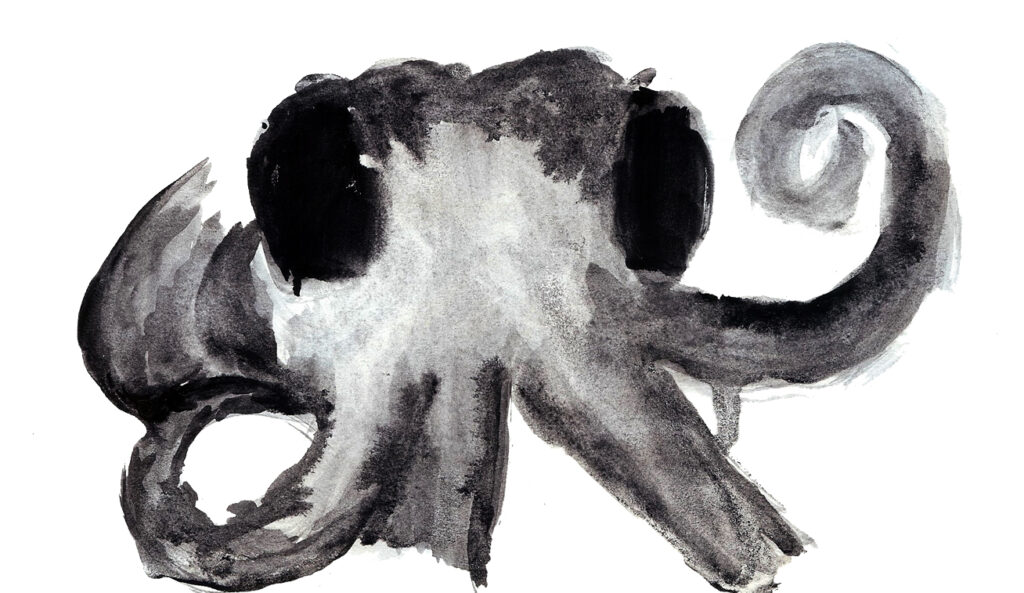Craig Foster’s stunning documentary, My Octopus Teacher, which is streaming on Netflix, tells the story of how Foster came to make friends with an octopus. I live in Hawai’i. I enjoy diving. As the first few minutes of the film unfolded, I couldn’t help but think about how wonderful it would be if I could make friends with an octopus of my own.
But after watching My Octopus Teacher, only one thing is clear: I will never make friends with an octopus. I don’t have the emotional fortitude to make friends with an octopus. These fragile, yet stunningly intelligent creatures only live about two years, and live those two years in a hostile and dangerous ocean, where at any moment they could become dinner.
While watching My Octopus Teacher I found myself at various points, sobbing and at other points, curled up into a fetal ball watching an octopus barely survive danger after danger. If I ever made friends with an octopus, there’s a good chance I’d drown myself, either trying to save it, or due to freaking out and hyperventilating underwater (if its safety were ever put in danger while I was around).
Foster had set himself the challenge to dive every day for a year, in the underwater kelp forests near Cape Town, where he grew up. These are dangerous oceans. In an interview Foster told NPR that he’s been sucked into sea caves. Foster dives without oxygen or a wetsuit in cold water. There’s a purity and a danger and a challenge to his initial conception of the film: namely, to go into the cold and stormy water every day and document what happens.
Foster’s genius is that he doesn’t let that ambitious premise get in the way of his storytelling. In the midst of our striving, what we discover is often the true end, and sometimes ambition takes us to places we never expected we’d go. That Foster dove everyday doesn’t matter. That he dove every day and in the process, befriended an octopus is everything.
This is a master class in art creation. Set out to do something ambitious by all means, but when the time comes to make something of that ambition, you must lead with the story, or the ambition is nothing at all. And Foster’s story is remarkable. He gains the octopus’s trust. He watches as the octopus is violently attacked by sharks, and there’s nothing he can do. He questions whether he should intervene with nature. He watches the octopus heal. He watches her cleverness, her joy, her ecstasy. He watches her lay her eggs and die.
Werner Herzog once wrote an essay called “On the Absolute, the Sublime, and Ecstatic Truth,” where he notes that the sublime lies in the place where the human overcomes nature. But My Octopus Teacher takes this ecstatic truth one step further. Not only do we observe the human overcoming nature, but we observe an alien familiar—the octopus—do the same. The film reminds us that the sublime doesn’t involve the subjugation of nature, but residence within it, survival within its power. This requires respect for its power, which Foster shows throughout. This isn’t some testosterone-hyped film about diving into deep and rough waters without a wetsuit. This is a film about what it means to be a mortal creature in residence in the natural world. This is about fragility.

My Octopus Teacher has been critiqued for the same reason Werner Herzog’s films have been critiqued. This isn’t educational documentary about the lives of the octopus. Foster isn’t here to teach us about the octopus’s suckers, nor is he performing scientific work. This isn’t documentary or an accounting of the facts. This documentary is about disclosure, about revelation. The education we are receiving is less physical and more metaphysical.
Foster leans into his friendship with the octopus even though he knows she will soon die. He is willing to embrace the pain in order to experience the joy of knowing her. And isn’t this life itself? Isn’t that love? Don’t we all have to face headlong the fragility of it all, the reality that someday everyone we love will die, the fact that everything we treasure isn’t permanent?
Maybe I’ll never make an octopus friend, or dive every day. But I do surf almost every day, and there are sea turtles who visit me often. They come up for air during big swells in Hawaii, letting me know that the bigger sets are coming through. If I watch them closely, they tell me where I need to be in the water to be safe. No, I won’t make an octopus friend (I don’t have the heart for it), but maybe I’ll take a moment to sit in gratitude for the friends I have—the long-living survivors—the sea turtles.
About the Writer
Janice Greenwood is a writer, surfer, and poet. She holds an M.F.A. in poetry and creative writing from Columbia University.
